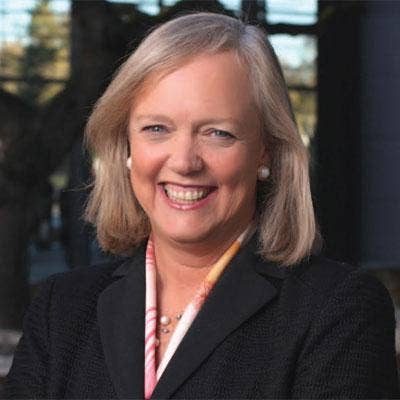10 Tough Questions: Partners Ask, HP's Top Executives Answer

Answering The Tough Questions
HP's top executive team, led by HP CEO Meg Whitman, conducted a 90-minute partner Webcast this week as the computer giant officially rolled out an aggressive new simplified pay-for-performance PartnerOne program with lucrative back-end rebates and no cap on how much partners can make. Here are 10 questions the top HP executives -- Whitman, HP Enterprise Group Executive Vice President Dave Donatelli, HP Printing and Personal Systems Executive Vice President Todd Bradley, HP Software Executive Vice President George Kadifa and HP Senior Vice President Enterprise Group Sales Sue Barsamian -- answered from partners.

Can You Comment On The Impact To HP From The Dell Buyout/Potential IBM Server Business Sale?
On the rumored sale at IBM [to Lenovo], you have players deciding are they going to opt in and play or are they going to opt out? You have other players saying my business model is very challenged by this change. How do I deal with that business model change? Which is what I think is happening in the case of Dell. Everybody who works at HP will tell you that certainty is very important in the enterprise. We have certainly learned that ourselves. Anytime you have lack of clarity and you have concern about what the future is, it is a great business opportunity.
We have a very clear product road map. And we think the potential impact here is that we can go get customers who are concerned about the future of their platforms and then sell them our next-generation products.
--Dave Donatelli

What Is The Difference Between The Dell PC Strategy And The HP Personal Systems Strategy?
I think clearly we are pursuing very, very different strategies. Our strategy is very focused on multiple operating systems and multiple chipset architectures. It is not focused on creating kind of a socket play for a group of services that we have gone out and acquired. Our go-forward strategy is very much one of partner engagement, of jointly winning in the marketplace. I think it is fair to say none of our competitors have either that public commitment nor a history of executing on that. I think the Dell buyout will just be a continuation of that.
--Todd Bradley

Can You Comment On HP's Commitment To The SMB Channel?
In our case, 66 percent of our revenue comes through the channel in all its forms. SMB is a large growth market not only here in the United States but all over the world. You have heard us say channel is the way we are going to go reach that market. So I think it is a great business opportunity for all our partners out there. It is one we are focused on. And you see us continuing to enhance our offerings for SMB- specific customers. So we have more competitive offerings. And as you know May 1 our new channel program kicked in, which gives us an even better channel program to go address those customers.
--Dave Donatelli

How Are SMB Customers Impacted By The Technology Changes Impacting the Market?
When you see the big shifts that are going on in this industry today, SMB is as affected by these shifts as enterprise. In fact, they need help even more than the enterprise because most SMBs don't have a giant IT department ready to help. So they need you. They need the channel to come help them get from where their technology is today to where it needs to be for them to remain competitive. So we think this is a great growth opportunity collectively for HP and the channel. And this is a group that is going to need some big help because it is a very tough area to navigate.
--Meg Whitman

Wouldn't It Be Easier If One Partner Business Manger Covered All Business Units For A Given Partner?
HP is a big broad company. And on one hand whereas it might seem easier to have a single point of contact for HP, we also hear that our partner business managers have to have real content and a real understanding of the portfolio that they represent. So what we have done is gone to a model where, aligned with the simplified business group structure that Meg announced for HP just about a year ago now, we will have a much smaller number of PBMs that represent the major business groups. So that is enterprise group, PPS and Software. And those three PBMs will work very closely together. And we actually think that model is a better model than a one-size-fits-all single PBM across all of HP. And obviously the onus is on us to make sure we are orchestrating across that smaller group of focused PBMs.
--Sue Barsamian

Can You Talk About HP Networking And What You are Seeing There?
We are the No. 2 [market-share winner] in the world. Our share has more than doubled over the last three years. And we are bigger than the next five nearest competitors combined. So the point is it is kind of a race between us and Cisco in the world of networking.
Our portfolio covers the entire gamut. We have wired. We have wireless. We can do the edge. We can do the campus. We can do the core. So it is an entire end-to-end solution. I will give you the most commonly asked questions we get: Can you intermix an HP network with Cisco? The answer is yes. About 90 percent of our customers do that.
The next question we always get is: How do you manage that? Our management software can manage both Cisco products and HP as well as Juniper and other major competitors in one place.
--Dave Donatelli

Will The Channel Be Able To Sell The Autonomy Product?
Definitely. The Autonomy iManage product line is the product line that focuses on document management around the legal profession. And in that area, we are actually the No. 1 player. We basically service about 80 percent of the large law firms. And now what we are doing is going to the enterprise and offering that kind of service to the enterprise. That is an area where we welcome channel participation because the set of opportunities is much larger and we are very, very focused on expanding that set of opportunities.
--George Kadifa

Is HP OK With Multivendor Deals?
In the spirit of openness -- and HP has always been an open [technology] provider -- yes, you can do multivendor deals. But we should also be clear that it is better together from HP. And as we look at our partner programs and the incentives that we put in front of our channel, you will clearly be incented to bundle the HP portfolio together. And as we roll out the changes in second half and the Nov. 1 changes that we spoke about in Las Vegas, you will see increasing incentive to really pull through the entire HP portfolio, whether it is convergence in the enterprise group or the entire HP suite.
--Sue Barsamian

What Do You Expect From Partners Beyond Just Sales Target Attainment?
So sales target attainment is a good thing. Let's start with that. We love that. I would say we really want you to engage with us. We have a broad product line that we provide to the channel. And we want you to pick the products that are going to work best for your customers and then really understand those products. Our world is changing, so you have to keep up to date with software-defined networking, Moonshot, Vertica, and the full new lineup of PCs and printers. When the partners and HP work together, it is one plus one equals three or four. So we are going to make it as easy as we can but you are also going to have to engage with us and keep up with the development of the market, which is moving as fast as I have ever seen in my career in technology.
--Meg Whitman

Talk About Software-Defined Networking And Your View of Oracle and VMware As Competitors?
The great news is with software-defined networking, HP has what we believe is the leading [SDN] technology in the marketplace today. In order to sell it you really need multiple things working for you: You have to have networking expertise. We obviously have that due to our [market] share. Second, you have to have an open architecture which, again, we are already shipping. It is really three layers: OpenFlow at the operating system level, an SDN controller and then open APIs that allow customers to actually program the network the way they want to. At HP we have all of these things. The other competitors that you mentioned really only have part of the solution. If you look at what VMware is doing, there is more of a partnership opportunity with HP than a competitive scenario. If you look at what Oracle is doing, I'd just say good luck.
--Dave Donatelli